White Pepper vs Black Pepper: Do They Really Taste Different?
If you’ve ever stood in the spice aisle, squinting at the two nearly identical jars labeled 'Black Pepper' and 'White Pepper,' wondering which one deserves a spot in your kitchen, you're not alone. The question on everyone’s lips is: Does white pepper taste different from black pepper?
In this article, we’ll take a deep dive into the flavor profiles, origins, culinary uses, and even the history of these two peppercorns. You'll discover whether it's worth stocking both or if you've been overcomplicating your spice game all along.
Table of Contents
- The Basics: What Are Black and White Peppers?
- Flavor Face-Off: How Different Are They Really?
- Culinary Uses: When to Use Which?
- Visual & Texture Differences
- Pro Tips: Choosing and Using White and Black Pepper
- Myths vs Facts: Common Misconceptions
- Summary: Does White Pepper Taste Different?
The Basics: What Are Black and White Peppers?
Let’s start with the most surprising fact: both white and black pepper come from the same plant — Piper nigrum, a flowering vine native to South India. The difference lies in how they’re processed.
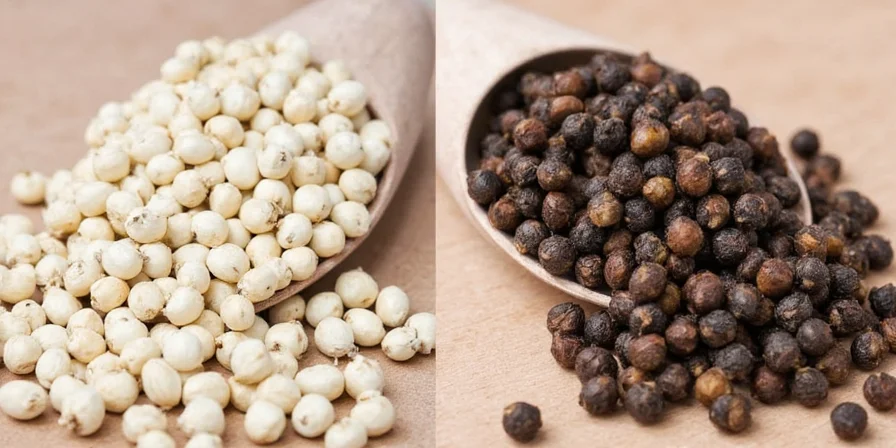
Black Pepper: The King of Seasonings
- Harvested when nearly ripe
- Dried in the sun, causing the skin to darken and crackle
- Has a bold, earthy, and slightly floral flavor
White Pepper: The Mellow Cousin
- Made by removing the outer layer of black peppercorns through soaking and fermentation
- Results in a smoother, less aggressive flavor
- Favored in light-colored dishes where appearance matters
Flavor Face-Off: How Different Are They Really?
The big question remains: Does white pepper taste different? The answer isn’t just “yes” — it’s a resounding “oh yeah!”
| Characteristic | Black Pepper | White Pepper |
|---|---|---|
| Flavor Profile | Earthy, sharp, aromatic | Subtle, woody, musty |
| Heat Level | Medium-High | Low-Medium |
| Best For | Most savory dishes, marinades, rubs | Cream sauces, mashed potatoes, Chinese soups |
| Aroma | Strong, citrusy notes | More muted, fermented undertones |
Why the Flavor Gap Exists
It all comes down to the pericarp — that’s the outer layer of the peppercorn. In black pepper, this layer is intact, giving it that signature pungency. In white pepper, the removal of the outer layer leaves behind more of the inner seed, which contains different volatile compounds and oils. This translates to a milder, but sometimes more complex, flavor.
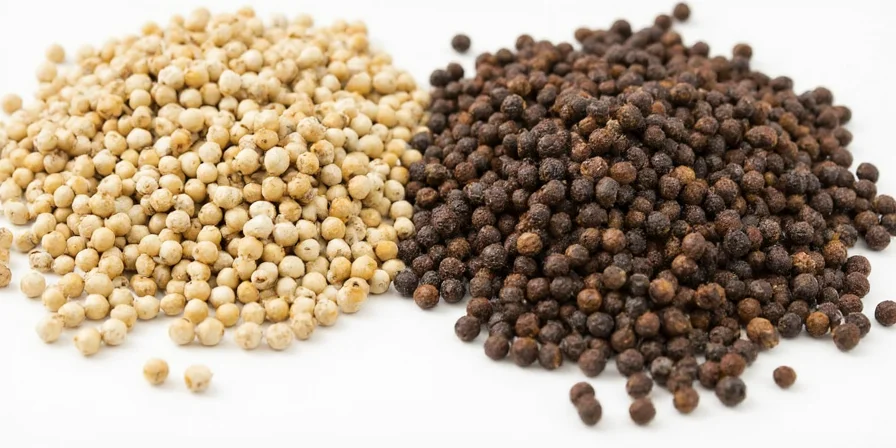
Culinary Uses: When to Use Which?
Understanding when to use each type can elevate your cooking game. Here's a quick guide:
When to Reach for Black Pepper
- Grilling meats
- Steak seasoning blends
- Tomato-based sauces
- Savory bread doughs
- Anything where visual presentation doesn't matter
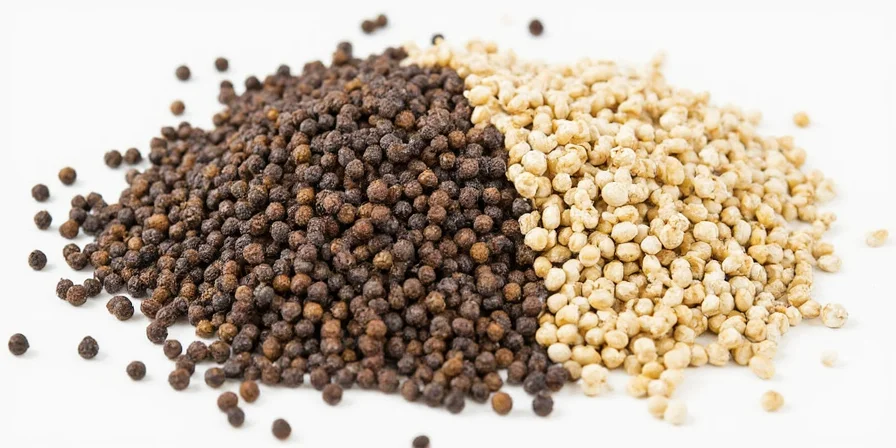
When to Go for White Pepper
- Creamy soups like bisques
- White sauces (béchamel, alfredo)
- Chinese hot pots and broths
- Mashed potatoes
- Any dish where color clarity is key
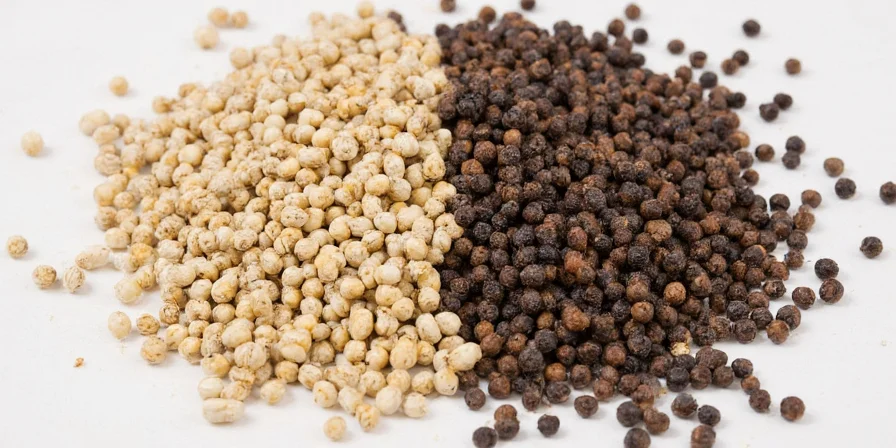
Visual & Texture Differences
Besides flavor, there are noticeable differences in appearance and texture:
| Aspect | Black Pepper | White Pepper |
|---|---|---|
| Color | Dark brown to black | Pale beige to off-white |
| Texture | Rough, wrinkled exterior | Smooth, uniform surface |
| Whole Peppercorn Appearance | Smaller, rounder | Larger, plumper |
| Ground Appearance | Dark powder | Light tan to grayish powder |
Pro Tips: Choosing and Using White and Black Pepper
- Always grind fresh – Pre-ground pepper loses potency quickly. Invest in a good pepper mill.
- Store properly – Keep peppercorns in a cool, dark place. Avoid moisture!
- Use white pepper sparingly – Its musty notes can easily overpower a dish.
- Toast for extra depth – Lightly toast whole peppercorns before grinding to unlock more flavor.
- Try different origins – Indonesian white pepper tends to be cleaner, while Vietnamese white has a funkier edge.
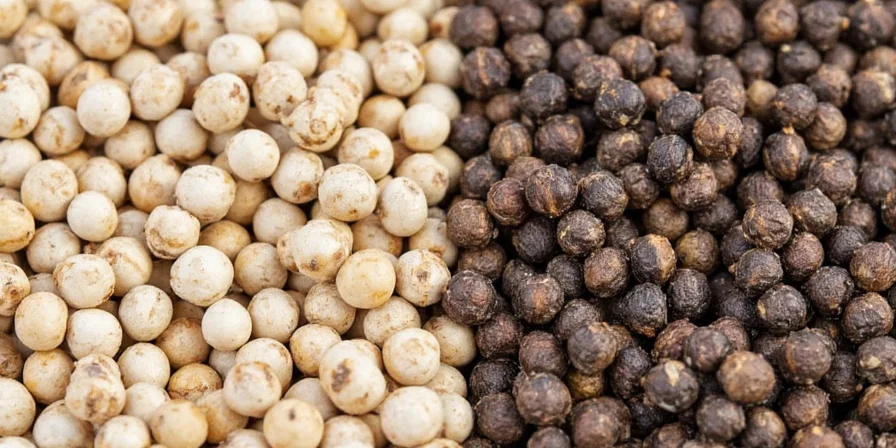
Myths vs Facts: Common Misconceptions
Let’s bust some myths and separate the spice facts from fiction:
- Myth: White pepper is just bleached black pepper.
Fact: It’s soaked and fermented, not chemically bleached. - Myth: White pepper is less spicy than black pepper.
Fact: Technically true, but it’s more about flavor complexity than heat level. - Myth: You only need one type of pepper in your kitchen.
Fact: Both have unique roles. Why limit yourself? - Myth: White pepper smells better.
- Fact: That depends on your nose. Some find its aroma musty; others call it refined.
Summary: Does White Pepper Taste Different?
To wrap it up in one bite-sized truth:
Yes, white pepper does taste different from black pepper. It’s smoother, less aggressive, and brings a subtler warmth to the table. While black pepper is bold and upfront, white pepper is more like the quiet friend who surprises you with hidden depth.
Whether you prefer one over the other or enjoy keeping both around for different recipes, understanding their unique characteristics can help you become a smarter, more confident home cook.
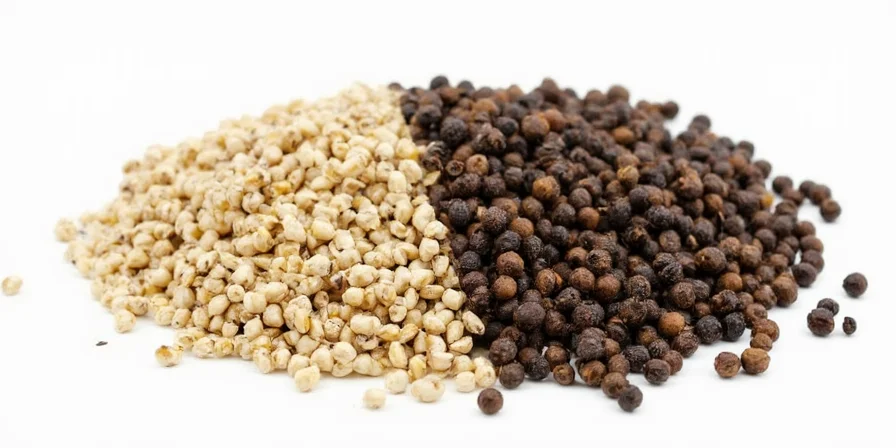
Final Thoughts
So next time you’re at the market and someone raises an eyebrow at your choice of pepper, you’ll know exactly what to say — and why. Spice is knowledge. And now, you’ve got the flavor facts to back it up.

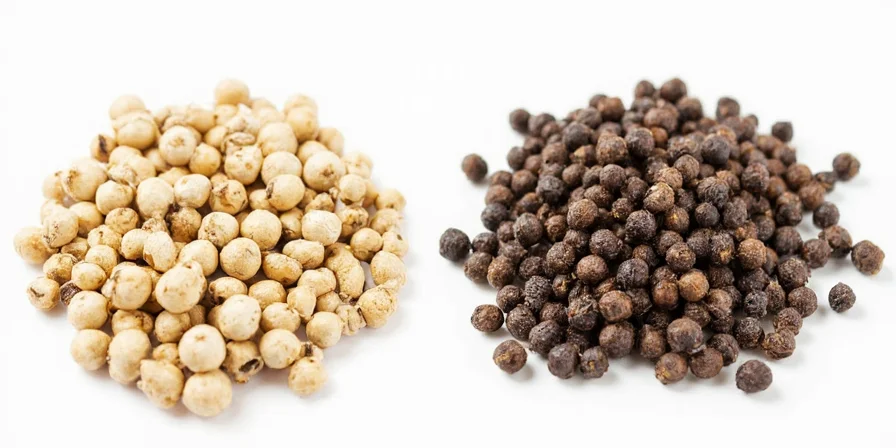









 浙公网安备
33010002000092号
浙公网安备
33010002000092号 浙B2-20120091-4
浙B2-20120091-4